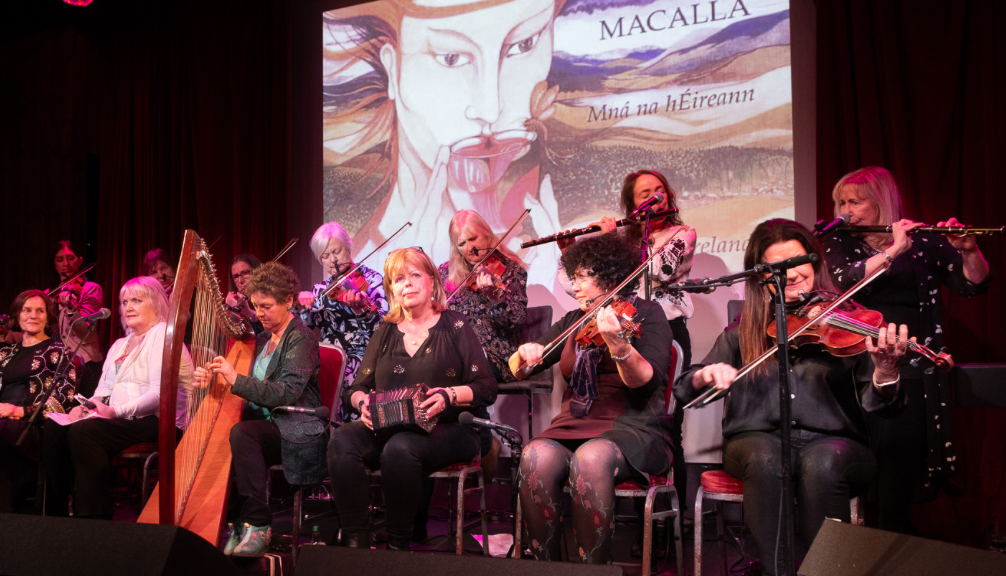The Sugar Club on Dublin’s Leeson Street was aglow with the soundscape of Ireland’s women on the evening of March 8. Macalla, an Irish traditional supergroup of women, first collaborated at the Dublin Folk Festival on International Women’s Day in 1984. The women represent different regions, each claiming a distinct musical style and identity, and they had initially been met with a societal reluctance to recognise their musicianship.
For their 40th Anniversary Concert on March 8, singer and Macalla member Seosaimhín Ní Bheaglaoich noted that some of the programme’s selections were ‘modern, as in only two hundred years old songs’. Spotlighted composers included Turlough O’Carolan and Thomas Connellan of the 17th and 18th centuries. The songs in the Irish language and the vast array of musical instruments on 2024’s International Women’s Day embodied both the expertise and eternity on stage. The daughters and granddaughters of the original Macalla members also presented their music, highlighting the power of cross-generational conversation among women. The artistic mastery, delight, and sweetness of both arrangement and melody only emphasised the energy that Irish traditional music has achieved because of such trailblazing.
“Macalla celebrates this investment in self and realisation of purpose as well as the trust integral to creativity”
Seosaimhín Ní Bheaglaoich enrolled at Trinity College Dublin as a mature student. “As a mother of two boys, a seven-year-old and a five-year-old, it was pretty hectic, but I was lucky as most lectures were in the morning when they attended national school…the five years I spent in Trinity were the most memorable of my life.” Studying Early and Modern Irish alongside Scottish Gaelic, Ní Bheaglaoich received a Higher Diploma in Education in 1982. She remembers Trinity as making her a lifelong student. “At the moment, I’m living again in a Gaeltacht area after decades of city life,’ shared Ní Bheaglaoich. She enjoys spending time in both landscapes, saying ‘it’s important not to stagnate or to get stuck in your ways.” Academically, Ní Bheaglaoich is focusing on further language study, including that of Welsh and Latin. Speaking to today’s young women, Ní Bheaglaoich says to “work hard, trust your instincts…and follow your heart!” Macalla celebrates this investment in self and realisation of purpose as well as the trust integral to creativity and a collaborative offering. But Macalla’s founding followed shortly after Ní Bheaglaoich’s graduation when she was appointed Clár Reachtaire/Journalist at RTÉ Radio na Gaeltachta in Dublin.
“I came along to a singers’ meeting in The Four Seasons at the top of Capel Street. The group of women, who were assembled from various Gaeltachts and musical backgrounds, soon launched into a magical bout of singing. A beautiful combination of individual voices and harmonies ensued and affirmed to all those present that this was worth presenting to an audience,” shared Nóra Máire Ní Loingsigh. It was made clear that one performance in 1984 wouldn’t satiate a culturally essential need to explore the musical palettes of Ireland’s women. Until Ní Loingsigh went to the United States in 1986, she recalls Macalla’s various stage and television performances, including one with Shane McGowan and the Pogues and recordings by Gael Linn. Her daughter Bríd Ní Fhearghaile is currently a second-year Trinity student studying Irish and English Literature.
“I find it really encouraging to see that the trad scene has evolved and that there are plenty of talented female musicians coming to the fore and are availing of the opportunity to enjoy a musical career”
Ní Fhearghaile observed that “as a fiddle player myself, most of the recorded albums I listen to are by male fiddlers, many of whom have passed on, like Michael Coleman and Tommy Peoples. I am now of an age where I can appreciate that Macalla had the courage to break the mould and led the way for female performers. I find it really encouraging to see that the trad scene has evolved and that there are plenty of talented female musicians coming to the fore and are availing of the opportunity to enjoy a musical career.”
Eimear Felle and her mother, Carmel, were in attendance at the concert on March 8. Felle recalled learning about Macalla through the choir she sings in, then noticing that her 4th and 6th class teacher, Edel McWeeney, was a member. “I wanted to enjoy a night of music with my mam; however, I had an ulterior motive, which was to thank Mrs McWeeney. It was twenty-five years since I’d seen Mrs McWeeney, but I never forgot her. She, alongside my mother and grandma, [is] the reason I am who I am today. She had such an influence in my life in all the right ways, and I wanted to thank her, face to face, so she could see my sincerity. I achieved my goal that night, all whilst enjoying a night of music, song and cheer from a chorus of women who did and did set the tone for Irish musicians in this country.






